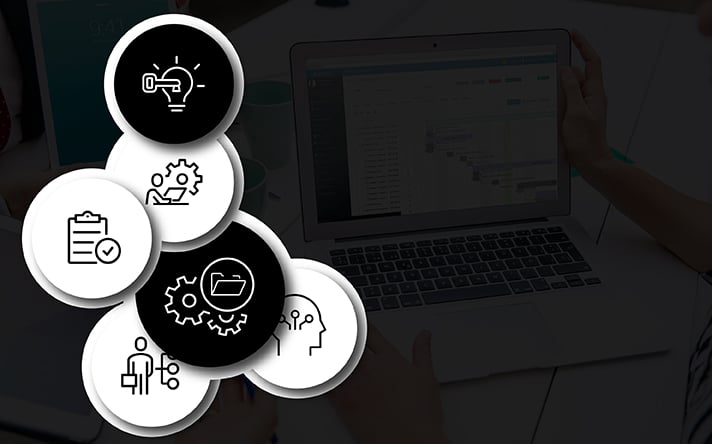
If you are responsible for planning and running projects in your retail business, you’ll undoubtedly come across project scoping. That’s because you cannot have a plan without first understanding the scope of your project. Also, if you determine the boundaries of your project before you begin anything, you stand a better chance at seeing success.
Of course, it doesn’t guarantee success - you still need to have a tight hold of all the pieces that make up your project.
That said, determining your scope does allow you to reduce the chaos and stress that can come with poor project management. There is also the point that if you don’t plan strategically, you can find yourself behind your competition and struggling to catch up.

What is Project Scoping?
As mentioned above, you cannot have a project without first determining its scope. So what is that scope?
In short, project scoping is the first step in project management.
In reality, it’s an essential step in the process because it determines everything. It includes deciding on your goals, how you plan on delivering these goals, the tasks to help you, the expenses and budget as well as your deadlines.
Let’s say, for example, you are an FMCG retailer, and you’re about to refresh your Non-Edible and Edible departments across all stores. It’s a large and time-consuming job that needs proper planning (and scoping) to get right. Also, it would help if you had everyone on board and pulling in the same direction.
Imagine attempting to do the above without first determining and mapping out what you need to do to complete the job successfully. Without a scope, you’re in the dark. Everything you do is counterproductive, and you could find yourself doing more harm than good.
Your initial project scope isn’t about going into the intricate details of your project. Yes, you do need to determine what you want to achieve and what you need to do to complete it. However, in this context, it’s about laying a framework for further work.
Another helpful way to determine your scope is to be specific about what is out of scope. Your project scoping should define the boundaries of what you aim to achieve.
Once you have a foundation; you can begin to dig into the details. For that, there is the project scope management plan, which includes three defined steps.

Understanding the steps of project scope management
As mentioned above, you can break down your project scope and the management thereof into three steps. The steps are Planning, Controlling, and Closing.
Planning
The planning stage of your project scope is straight-forward. Here, it’s about collecting and determining the work you need to do to complete the project. If you invest enough time in planning out your project - mapping it out entirely and leaving nothing out - everything else will be that much easier.
You can expect less chaos, less stress, and less frustration for everyone.
Let’s use the same example that we used above - the refreshing of the Edible and Non-Edible Departments across your stores. That’s the first part of the planning - you’ve determined what you need to do. From there, it’s critical that you understand what you need to begin the work.
In this case, you could build a meeting pack and liaise with your buyers to determine your flows and space apportionment. The goal is to complete a refresh with an updated range within a set timeframe.
Controlling
Once you’ve done your planning, it’s all about controlling the project. A better way of describing it is to manage your project.
If we wanted to refresh the Edible and Non-edible department, you’d need to manage the process of doing that. How are you going to track your progress? What do you need to do to manage scope creep?
If the requirements change or something happens that means you need to alter your plans, are you flexible enough to make a change mid-project?
The right project management software can certainly help you to gain control of any planned project. More importantly, with it, you’ll know what’s meant to happen during any part of the project.
For example, you know that you can’t do a refresh without first determining the flow of your category. With specialised software, you can have an overview of your project and all the necessary information to ensure the work progresses as it should.
Closing
The final step is closing. Here it’s about looking back at a completed project and measuring its success.
Did you accomplish what you intended to achieve when you first began the project? What could you have done better if you restarted the project?
Let’s use Activ8, our team management software for retail with project management functionality as an example. With it, you can complete the closing with help from our scoping and closure sections.
For the scoping section, you can document what you need to accomplish to ensure the successful completion of your project. As part of it, you can add as many questions as you wish. These questions can detail what you need to do to move the project forward.
For the closure section, it’s about looking back at the project as a whole. You can do this before you complete the project or afterwards.
Did you meet the requirements of the project? Did you stick to the signed-off budget? If anything went wrong, what happened?

Why is project scoping critically important in retail?
It’s not difficult to understand or acknowledge the importance of project scope. As mentioned earlier in this article, it’s the first step in project management.
That said, it’s still worth unpacking the reasons why. After all, it’s one thing to say it’s essential and another to show it with further explanation.
Here’s what project scoping can help you with, and why it’s critically important to retail:
It helps you to avoid common (and unnecessary) problems
For one, it helps you to avoid any problems commonly associated with running projects.
Common issues can include anything from overspending on the budget to misjudging how long the project will take. Alternatively, not even meeting the goals set out at the start of your project. By mapping out a path and including all documentation needed to take you from your starting point to your desired end goal, you reduce the chance of facing any of these easily avoidable obstacles.
What’s more, it allows you to keep track of what’s going on. It comes back to the ‘Controlling’ phase of project scope management. Better management will lead to a better outcome. A benefit of having a firm grasp of everything is that it should also lessen any stress.
How so? When you create a plan and stick with it, you’re more than likely to end up with the desired result. Moreover, you’ll achieve it within the timeframe set out.
Of course, you do need to ensure you’ve scoped out your project thoroughly. Doing so will help you also to be flexible enough to make changes to any project as you go.
It helps drives the work through to completion
Without project scoping, you don’t have a project. It’s that simple.
Why?
Because everything that happens in your project stems from your scoping document, it informs all of your decisions. Without it, you wouldn’t have an understanding of budgets or cost or even how to measure your success.
It sets out everything that needs to happen and gives you the exact route to take. Another way of putting it is this: it’s your map to get you to where you want to go.
Let’s say you’re sitting with old planograms - Point A and you want to refresh them, which is Point Z.
If you’ve scoped out your project and not left anything out, it will help you to navigate all the tasks, budget constraints, deadlines and so on to ensure you complete the project. Not only complete the project but complete it successfully.
Conclusion
Activ8 is team management software for retail with project management functionality. If you’re interested in creating, managing and seeing successful projects through to completion, Activ8 is for you. Learn more by scheduling a demo with one of our sales consultants below.



